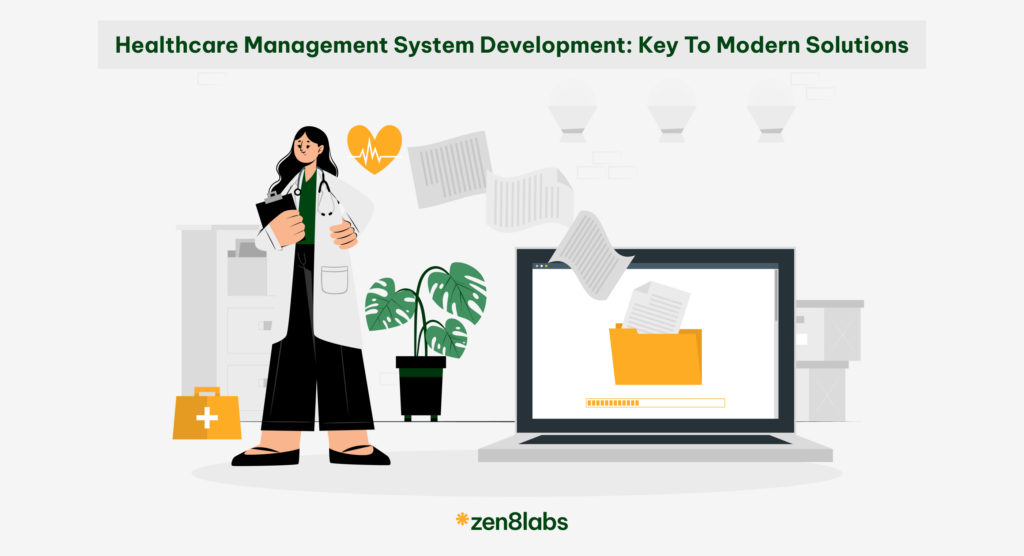
Rapid technological advancements, shifting patient demands, and the growing need for effective healthcare delivery are all driving changes in the healthcare sector. A strong Healthcare Management System (HMS) is more important than ever as healthcare providers struggle to manage patient data, maintain compliance, and offer high-quality care. We will examine the crucial elements of creating an HMS in this extensive guide, as well as the reasons why modern healthcare organizations must implement such systems in order to maintain their competitiveness, enhance patient outcomes, and simplify operations.
What is a healthcare management system?
A Healthcare Management System (HMS) is a comprehensive digital solution designed to optimize the management of healthcare facilities, streamline administrative processes, and improve patient care. This central platform combines different functions like patient files, invoicing, setting up visits, keeping track of supplies, and organizing medical personnel. When healthcare providers use an HMS, they can run their operations more while making sure patients get the right care when they need it.
For more information: Successful healthcare projects
Why healthcare management system development is essential?
When healthcare providers invest in building an HMS, they can tackle several important issues while setting themselves up to give patients better results. Here are some of the main reasons why it’s crucial to build a healthcare management system for modern healthcare.
1. Improved patient care
Any healthcare organization revolves around patient care, and HMS systems are essential to raising the standard of care provided. Healthcare professionals may make better decisions and give better treatment outcomes by centralizing patient data and making it instantly available. To make prompt and precise diagnoses, for instance, a doctor can instantaneously access a patient’s complete medical history, past treatments, allergies, and test results.
Furthermore, automated notifications and reminders are frequently included in HMS systems, guaranteeing that patients receive follow-up care and follow their treatment regimens. Overall health results and patient satisfaction are enhanced by this proactive approach to care.
2. Streamlined operations and efficiency
Healthcare facilities are often burdened with administrative tasks that take valuable time away from patient care. Many of these procedures, including scheduling, billing, and claims administration, are automated by HMS development, which lowers the possibility of human error and frees up employees to work on other important projects.
Additionally, automation speeds up the completion of necessary tasks including creating reports, processing payments, and updating patient data. Better use of resources, quicker treatment, and reduced patient wait times can all be outcomes of this enhanced efficiency.
3. Regulatory standards
Healthcare is one of the most heavily regulated industries, with strict guidelines for data privacy, billing, and clinical practices. The purpose of an HMS is to guarantee adherence to laws such as the Health Insurance Portability and Accountability Act (HIPAA) in the United States and comparable guidelines across the globe.
An HMS can lower the risk of non-compliance, which can result in expensive fines and legal problems, by automating procedures and keeping correct records. The majority of systems also have encryption and other security features to guard against breaches and illegal access to private patient information.
4. Financial sustainability and cost reduction
The long-term financial rewards of developing an HMS are great, even though the initial expenditure may be high. By automating processes, optimizing resource allocation, and reducing errors, HMS systems lower administrative expenses. Through expediting the billing procedure and guaranteeing precise claim submission, healthcare facilities can benefit from enhanced cash flow and quicker insurance provider payments.
Additionally, a less need for overtime, fewer administrative employees, and better utilization of medical supplies result from an HMS’s increased operational efficiency, all of which lower costs.
5. Data-driven decision making
In today’s data-driven world, healthcare organizations can no longer afford to rely on guesswork or outdated methods for decision-making. An HMS provides real-time data and analytics that allow administrators to make informed decisions about resource allocation, patient care, and operational improvements. For instance, data from an HMS can identify places where patient care can be enhanced, show trends in-patient admissions, or indicate inefficiencies in staff procedures. This data-driven strategy aids healthcare practitioners in improving overall results and proactively addressing new issues.
Key components of a healthcare management system
The following essential elements are commonly found in an efficient HMS:
1. Electronic health records (EHRs)
Since they offer a safe, digital archive for patient health data, EHRs are the foundation of any HMS. Electronic Health Records (EHRs) facilitate access to comprehensive patient histories and treatment records and guarantee that pertinent data is readily available for well-informed decision-making.
2. Patient management
From registration until discharge, smooth patient management is made possible by a well-designed HMS. It lessens the administrative load on employees while assisting with appointment scheduling, patient progress monitoring, and patient billing management.
3. Revenue cycle management and billing
Healthcare billing can be complicated because it involves several payers and different payment plans. By automating billing procedures, an HMS lowers errors and guarantees regulatory compliance, which accelerates revenue cycles.
4. Clinical decision support
HMS systems equipped with clinical decision support tools help healthcare professionals make data-driven decisions by providing access to evidence-based guidelines, diagnostic tools, and patient data analysis.
5. Inventory and supply chain management
Managing medical supplies and equipment is critical for any healthcare facility. HMS systems allow administrators to monitor stock levels, track usage, and order supplies efficiently, ensuring that critical resources are always available.
6. Remote monitoring and telemedicine
By integrating telemedicine capabilities, medical professionals may monitor patients’ health remotely and provide virtual consultations. This is particularly crucial in underserved or rural areas where access to in-person care may be restricted.
7. Reporting and analytics
An HMS provides strong analytics and reporting capabilities to track key performance indicators (KPIs), enhance clinical results, and maximize operational efficiency as data-driven healthcare becomes more commonplace.
Key considerations for healthcare management system development
While the benefits of an HMS are clear, developing an effective system requires careful planning and consideration. Here are some factors that healthcare organizations should consider when embarking on HMS development.
1. Customization vs Off-the-shelf solutions
Many healthcare facilities must decide whether to develop a custom HMS tailored to their specific needs or opt for an off-the-shelf solution. While off-the-shelf systems may be quicker to implement, custom solutions offer greater flexibility and can be adapted to meet the unique needs of the organization.
2. Interoperability
A successful HMS must integrate with other systems, such as lab management software, radiology systems, and pharmacy management tools. Ensuring that the HMS can communicate with these systems is critical for providing comprehensive care.
3. User training and Support
Implementing a new HMS is only the first step; staff training and ongoing support are essential for ensuring that the system is used effectively. Healthcare organizations should prioritize user-friendly interfaces and provide ample training to ensure that all staff can navigate the system with confidence.
4. Scalability
As healthcare organizations grow, their HMS must be able to scale alongside them. Whether expanding to new locations, adding new services, or accommodating more patients, the system should be able to handle increased demand without compromising performance.
The future of healthcare management systems
As technology continues to evolve, so too will HMS capabilities. In the future, we can expect to see more advanced features such as artificial intelligence (AI) and machine learning (ML) integrated into HMS systems, enabling even more accurate diagnoses, predictive analytics, and personalized patient care.
Additionally, the rise of wearable health technology and the Internet of Medical Things (IoMT) will likely be incorporated into HMS platforms, providing healthcare providers with real-time data on patient health metrics and enabling more proactive care management.
In the current medical field, creating a strong Healthcare Management System plays a key role to boost operations, provide better patient care, and stick to rules. If you want to cut down on office work, make patients happier, or smooth out billing and stock control, an HMS is a big step that leads to success in the long run. At zen8labs, we specialize in building custom Healthcare Management Systems tailored to the unique needs of your organization. Our skilled team will help you from start to finish, making sure your system can grow, stays safe, and is ready for what’s ahead. Do you want to push your health center forward? Get in touch with us now to find out how we can help you build a system that changes how your healthcare works.





